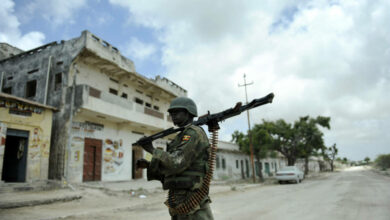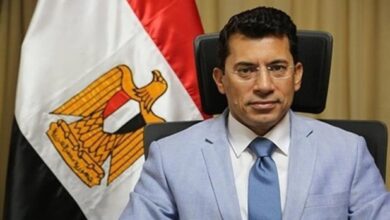Somalia's prime minister resigned Tuesday after months of turmoil with the country's president, saying their infighting had become a "security vulnerability" in a country battling an Islamic insurgency and rampant piracy.
The political shakeup, though, was unlikely to have much practical effect on Somalia's weak government, which controls only a few blocks of the capital and comes under near-daily attack from al-Qaida-linked militants.
Omar Abdirashid Ali Sharmarke told reporters he was resigning while standing alongside President Sheik Sharif Sheik Ahmed, who thanked the prime minister for what he called a "courageous decision."
"After seeing that the political turmoil between me and the president has caused security vulnerability, I have decided to resign to save the nation and give a chance to others," the prime minister said.
The resignation comes amid a rift between Sharmarke and Ahmed over a new draft constitution. The two have not gotten along for months, and a vote of confidence on the prime minister had been scheduled over the weekend, though it was postponed. The two have a history of conflict: the president fired Sharmarke in May but quickly retracted the dismissal.
Ahmed called Sharmarke's decision "historic" because the impasse was settled among Somalis instead of seeking outside intervention. Sharmarke, who holds a Canadian passport, became prime minister in February 2009 after the government signed a deal with opposition groups led by Ahmed.
The prime minister appeared far from downcast as he announced his resignation. Sharmarke smiled and waved to reporters as he left the news conference, which was well-attended by members of parliament and Cabinet members. The current Cabinet will lose their posts with Sharmarke's resignation; the next prime minister will name a new Cabinet.
"Both men looked very happy. I was not expecting them to look so. There must be a hidden agenda they have agreed to," said Mowlid Maane, a parliamentarian, commenting on rumors swirling through Mogadishu that Sharmarke was paid to go away quietly.
Ahmed said he will build a new government soon.
"Now the recent political turmoil has ended and the government is gone. Let us wait and see what is next. I hope an effective government that saves this nation," said Abdirashid Hidig, the state minister for domestic affairs.
Somalia has not had an effective government for 19 years.
When Ahmed picked Sharmarke, a Western-educated technocrat and son of a popular Somali leader who was assassinated in 1969, many thought the pair would help propel the country forward and convince Islamist rebels to join the government.
But rebels dismissed the idea of joining a Western-backed government and continued their attacks.
Analysts say the lack of clear job descriptions between the prime minister and president helped fuel rifts. Since its formation in 2004 in neighboring Kenya, the fragile government has seen the resignation of two prime ministers and one president. Each time the top two leaders were sparring over power and seniority.
"The removal of Sharmarke will not change a single iota of the current situation of the government in Somalia," said Rashid Abdi, a Somali expert with the International Crisis Group. "It will be only a matter of time before we have another crisis. The Somali leaders are trapped in a system that allows both the president and the prime minister executive powers… It is neither parliamentary nor presidential."
The president bristled at the prime minister's close relationship with Western countries who were pressing politicians to pass a new constitution that would end Ahmed's term next year.
Sharmarke wanted the draft to be passed by the parliament and civil society leaders while the president says the public's views should be sought before the document was finally put to popular vote.
Critics say the president's objection is mainly based on his desire to extend his term beyond August 2011.




